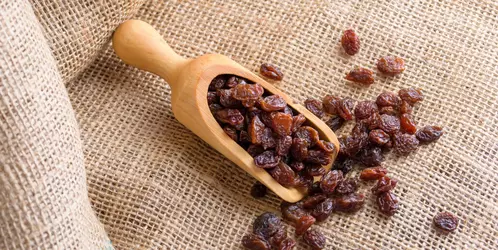Can Dogs Eat Raisins?
- 26 Jun 2024
- 3m read

No, dogs should not eat raisins. Similarly, to grapes, raisins can cause severe harm to dogs.
Are Raisins Poisonous to Dogs?
Yes, raisins are poisonous to dogs.
Despite their small size and sweet taste, raisins can cause severe health issues in dogs, including kidney failure. It's crucial to keep these dried fruits out of reach of your dog and seek immediate veterinary care if ingested.
What to Do if Your Dog Eats Raisins
If your dog eats raisins, it's important to take immediate action to minimise potential harm. Here are the steps you should follow:
Contact your vet
Call your vet immediately. Provide details such as the quantity of raisins eaten, your dog's breed, age, and any symptoms observed. Follow their advice closely.
Monitor your dog
Keep a close eye on your dog for any signs of distress or illness.
Don’t wait for symptoms
Even if your dog is not showing immediate signs of illness, do not wait for symptoms to appear before seeking help. Raisin toxicity can be unpredictable, and early intervention is crucial.
Receive veterinary treatment
Depending on the severity of the ingestion and your dog's symptoms, your vet may recommend hospitalisation for monitoring and supportive care.
How Long After Eating Raisins Will a Dog Get Sick?
The onset of symptoms after a dog eats raisins can vary widely and is not always predictable. In some cases, symptoms may appear within a few hours of ingestion, while in others, it may take up to several days for signs of illness to manifest.
If your dog has ingested raisins, don't wait for symptoms to show before contacting your vet. Early intervention can significantly improve the outcome for your furry friend.
What are the Signs of Raisin Poisoning in Dogs?
Signs of raisin poisoning in dogs can vary depending on the individual dog and the amount of raisins consumed. Common symptoms to look out for include:
Vomiting
Diarrhoea
Lethargy
Abdominal pain
Decreased appetite
Increased thirst and urination
Dehydration
Tremors or seizures
How to Prevent Raisin Ingestion in Dogs
Preventing raisin ingestion in dogs is crucial, here are some important steps you can take:
Awareness and education
Educate yourself and everyone in your household about the dangers of raisins and grapes for dogs. Ensure that all family members and visitors understand that these foods can be toxic to dogs.
Keep raisins out of reach
Store raisins securely in sealed containers and keep them out of reach of your dog. This includes not leaving them on countertops or tables where your dog could potentially access them.
Be cautious with foods containing raisins
Be mindful of foods that contain raisins, such as certain breads, cereals, trail mixes, and baked goods. Check ingredient labels and avoid feeding any foods containing raisins to your dog.
Dispose of raisins properly
Dispose of leftover raisins in a secure bin that your dog cannot access. Even small amounts can pose a risk, so be thorough in cleaning up and disposing of these items.
Feed safe treats
Opt for dog-safe treats and snacks specifically designed for dog’s consumption. This ensures that your dog enjoys tasty rewards without the risk of accidental poisoning.

.webp)


